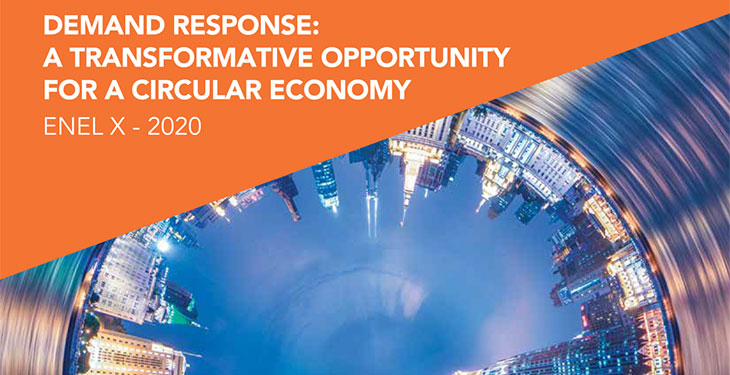Enel X, the Enel Group’s global business line dedicated to advanced energy services and products, has published the Circular Economy Factbook 2020, an annual report on Enel X’s circular economy activities: methodologies, program, projects, innovations and practical case studies that the company is using to help make sustainability and the circular economy the most important competitive levers for its business globally.
“The Circular Economy Factbook 2020 is a unique document that Enel X uses to reinforce its role as an accelerator in the transition to a sustainable business model centered on the principles of the circular economy,” said Francesco Venturini, CEO of Enel X. “With this annual report, we wish to tell the story of circular economy, within the complex ecosystem of Enel X’s suppliers, customers, as well as commercial and industrial partners, even to our competitors, with the aim of pushing the entire industry down a virtuous path to compete on excellence and sustainable innovation.”
The Circular Economy Factbook 2020 presents, first and foremost, the methodology behind Enel X’s challenge to spread circularity, the Circular Economy Boosting Program. The program is a dynamic approach that can be applied to Enel X’s solutions with the allocation of a Circularity Score, as well as to customers and partners with a detailed Report that measures and identifies the best decarbonization strategies and most sustainable technologies. In 2019 and 2020, Enel X calculated 53 Scores to measure the circularity of products in its portfolio. 20 Circular Economy Boosting Programs were then implemented, making it possible to identify 36 new projects aimed to increase the circularity of the analyzed solutions. For example, by applying the Circular Economy Boosting Program to Juicebox, Enel X’s private electric vehicle recharging solution, a process was set up to reuse plastic waste from Group projects to make the Juicebox outer casing. In 2020, the first 3,000 units were produced in this way, saving 17 tons of CO2. This solution will be rolled-out across Europe in 2021, producing over 35,000 units, using about 70 tons of plastic waste and saving around 185 tons of CO2. A further roll-out is already planned outside Europe.
One of the most innovative tools in the Factbook 2020 is the Circular Economy Report that Enel X provides for Public Administrations (PA) and companies, helping them measure and be aware of the circular maturity starting level as well as identify tools to support their decarbonization process. This stimulates and leads to greater sustainability in the whole market, with a corresponding reduction in environmental risks and cost savings for companies and PAs that choose to embark on a virtuous journey. In the second half of 2020 alone, around 50 Circular Economy Client Reports were completed for companies in the manufacturing, agricultural, textile, chemical and pharmaceutical sectors. They support the implementation of measures such as the use of distributed renewable energy generation systems and energy efficiency measures that could avoid the potential annual emission of 7,000 tons of CO2 and generate up to 10,000 MWh of energy savings.
Enel X’s challenging goal is to produce around 4,000 reports in Italy alone over the next four years, spreading a culture of circularity as widely as possible throughout Italy’s SMEs and large companies.
In the Circular Economy Factbook 2020, Enel X also presents the initiatives it uses to spread awareness of the circular economy as a sustainable and economically competitive business model, capable of setting Italy and its companies apart in the world. Among the initiatives launched to date are important partnerships with associations to accelerate the transition to the circular economy in their business areas, these include Confindustria, the Consorzio del Prosecco Superiore Valdobbiadene D.O.C.G., the Consorzio a Tutela del Vino Morellino di Scansano, and Sant’Anna and Siena Universities.
